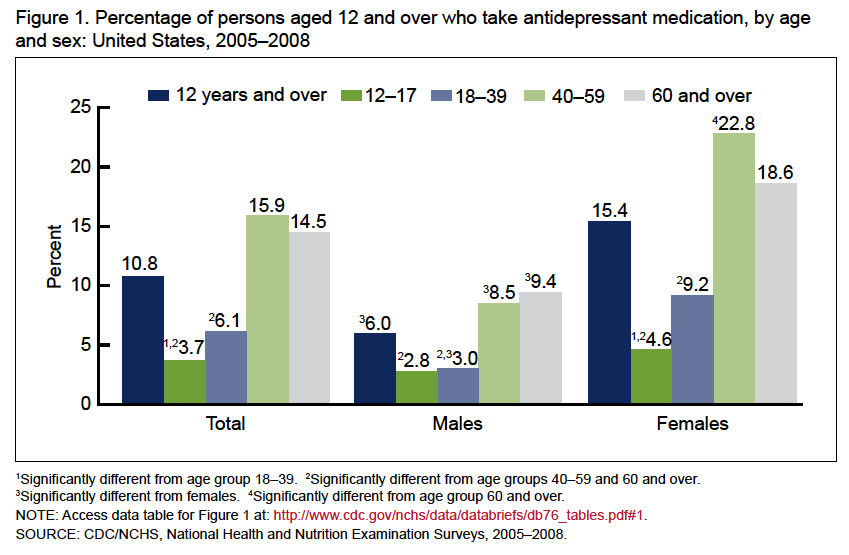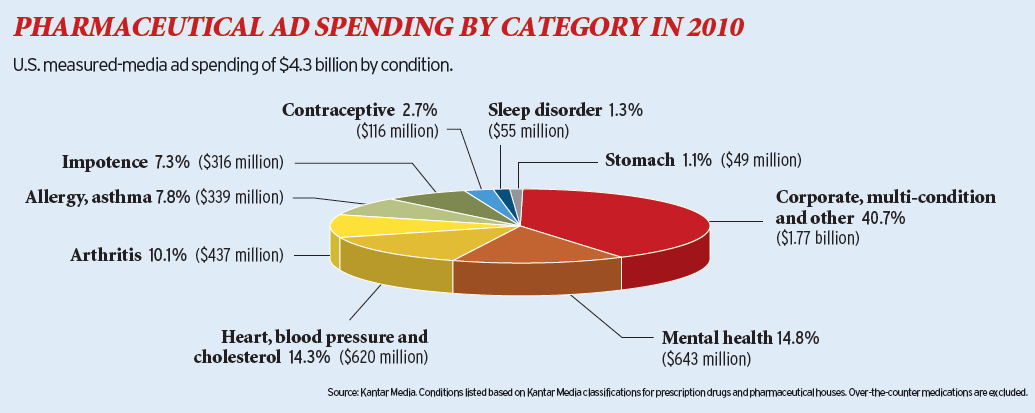Antidepressants: Top Advertised & 3rd Most Commonly Used Rx Drug According to a recent CDC Data Brief (find it here), antidepressants were the third most common prescription drug taken by Americans of all ages in 2005-2008 and the most frequently used by persons aged 18-44 years. From 1988-1994 through 2005-2008, the rate of antidepressant use in the United States among all ages increased nearly 400%.
Key findings (2005-2008):
- Eleven percent of Americans aged 12 years and over take antidepressant medication.
- Females are more likely to take antidepressants than are males, and non-Hispanic white persons are more likely to take antidepressants than are nonHispanic black and MexicanAmerican persons.
- About one-third of persons with severe depressive symptoms take antidepressant medication.
- More than 60% of Americans taking antidepressant medication have taken it for 2 years or longer, with 14% having taken the medication for 10 years or more.
- Less than one-third of Americans taking one antidepressant medication and less than one-half of those taking multiple antidepressants have seen a mental health professional in the past year
Here’s a chart that breaks it down by age group and males vs. females:

Perhaps not so coincidentally, antidepressants are among the TOP advertised Rx category in 2010, according to the recent AdAge analysis I summarized in a previous post (see “Double Dip in DTC Spending Plus 33% Drop in Internet Display Ad Spending!” and pie chart below).

Of the TOP 25 advertised drugs in 2010, DTC ad spends for antidepressants was 20% of the total (24% if you include Lyrica, which is not indicated for depression but is often prescribed for depression off-label).
The CDC data covers the time period 2005-2008, which is somewhat prior to when the full effects of the recession were felt by the recently unemployed.
Women are twice as likely to take anti-depressants than men (Overall, 40% of females and 20% of males with severe depressive symptoms take antidepressant medication says CDC). Actually, for all degrees of symptoms, women are 2,5 times more likely to take antidepressants than men (see data in chart above).
Why are proportionately more women taking antidepressants than men? The CDC News brief doesn’t say, but news reporters have suggested that more women are caregivers and therefore subject to depression linked to that.
Or could it be the DTC advertising of antidepressants that lead more women to ask their doctors about antidepressants (see, for example, “Women Need More Love, Less Drugs“)?
Actually, practically every DTC ad (except ads for Viagra) “speaks” to women — the ads most often focus on the woman as the sufferer of the indicated condition or the caregiver.
This is part of an issue that I will discuss with several experts in an upcoming LIVE podcast titled “How to Score With Women (as a Marketer) via Social Media.” One question I’d like to ask the experts is this: Do pharma marketers focus on women because they are the majority of the audience or because they buy more products (including drugs) than men (ie, are more prolific consumers than are men)? I tend to favor the latter over the former. What do you think?
Originally posted to Pharma Marketing Blog (here) on 24 October 2011. Find comments to this post there.
PMN1016-06
Issue: Vol. 10, No. 16
Publication date: 27 October 2011
Find other articles in related Topic Areas:



![6 Digital Tools at the Center of Healthcare Digitalization [INFOGRAPHIC]](http://ec2-54-175-84-28.compute-1.amazonaws.com/pharma-mkting.com/wp-content/uploads/2021/04/6DigitalTools_600px-218x150.jpg)




![6 Digital Tools at the Center of Healthcare Digitalization [INFOGRAPHIC]](http://ec2-54-175-84-28.compute-1.amazonaws.com/pharma-mkting.com/wp-content/uploads/2021/04/6DigitalTools_600px-100x70.jpg)




